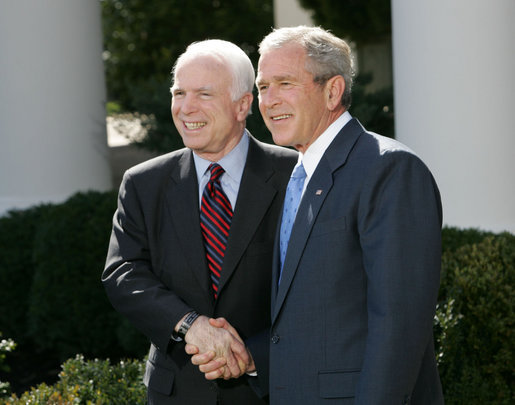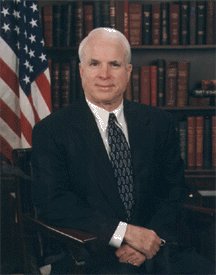
Pretty much up to now, the campaigns have examined the domestic economy and the Iraq war as discrete phenomena, each deserving of being separated as bullet points in campaign rallies, and certainly separated in the media's questioning during the recent high season for debates.
But recent speeches at Obama and Clinton rallies, more recent estimates of the war's cost exceeding $600 billion, and McCain's tepid performance this week at a "major speech" on economic policy suggest strongly that the GOP drive for the White House may be more vulnerable to its own inadequacies than to the Democratic opposition, whoever that opposition is.
◊ ◊ ◊
On more than one occasion, well before the current campaign, McCain has admitted to being a neophyte in the world of economics, despite his role as the ranking Republican member of the Senate Commerce Committee. At first blush maybe some populist reflex reaction kicked in for Arizonans, something they could relate to: Hell, like a lot of Americans, they couldn't figure out the world of economics, either.
But the stakes are higher for McCain as a presidential candidate; what might play as endearingly sympathizable ignorance in your home state becomes more problematic at the national scale, with another 49 state treasuries under your watch.
 In the speech McCain made Tuesday in Orange County, Calif., the senator emphasized two principal points. "First, it is time to convene a meeting of the nation's accounting professionals to discuss the current mark to market accounting systems. We are witnessing an unprecedented situation as banks and investors try to determine the appropriate value of the assets they are holding and there is widespread concern that this approach is exacerbating the credit crunch.
In the speech McCain made Tuesday in Orange County, Calif., the senator emphasized two principal points. "First, it is time to convene a meeting of the nation's accounting professionals to discuss the current mark to market accounting systems. We are witnessing an unprecedented situation as banks and investors try to determine the appropriate value of the assets they are holding and there is widespread concern that this approach is exacerbating the credit crunch."We should also convene a meeting of the nation's top mortgage lenders. Working together, they should pledge to provide maximum support and help to their cash-strapped, but credit worthy customers. They should pledge to do everything possible to keep families in their homes and businesses growing."
For observers, it was pretty weak tea. "The bulk of McCain's speech's recaps the broad outlines of what has transpired in the housing sector and Wall Street over the past year and reads as if cribbed from various state-of-the-economy reports previously delivered by Treasury Secretary Hank Paulson and chairman of the Federal Reserve Ben Bernanke," said Salon's Andrew Leonard.
McCain didn't help himself much with one particular excerpt that was, well, breathtaking:
"Already-tight household budgets are ... getting tighter," he told an audience in southern California, an audience whose grasp of this insight surely rivals his own.
◊ ◊ ◊
Credit MSNBC's Keith Olbermann for a rundown of three of McCain's more overt admissions of fiscal ignorance:
In January 2000 McCain told The New Republic that "I didn't pay ... attention to [economic] issues in the past."
In November 2005 McCain told the Wall Street Journal that "I know a lot less about economics than I do about military and foreign policy issues."
In December 2007 McCain told the Baltimore Sun that "...[e]conomics is something that I've never understood as well as I should."
One quakes with fear for the status of the McCain family budget.
There's already been some spin; much of McCain's speech was a practical call for a variety of ideas on some economic course correction, a plurality of opinions from Alan Greenspan, Paul Volcker and others. At one level this makes sense; if you can't do something or do something well, hire a professional who does. But for a candidate whose political ascendancy has had much to do with cultivating a reputation as a maverick, there's precious little that's original about outsourcing your economic strategy.
Quietly, the word is out: This is the best antidote for the economy the Republicans have. This economic naivete, this lack of understanding is the best they're going to get. And this is something they can't retrofit. It can't be "fixed." It's built into the candidate. For McCain, the lack of fresh, thoughtful, nuanced, doable strategies for healing the national economy isn't an Achilles heel, it's an Achilles appendage. For millions of the Americans he will need as voters, this issue is The Issue, and by his own admission, the ranking Republican member of the Senate Commerce Committee hasn't got a clue.
And that's where the Democrats come in.
◊ ◊ ◊
"When you're spending over $50 to fill up your car because the price of oil is four times what it was before Iraq, you're paying a price for this war," Obama said Thursday in Charleston, W. Va. "When Iraq is costing each household about $100 a month, you're paying a price for this war."
 "For what folks in this state have been spending on the Iraq war, we could be giving health care to nearly 450,000 of your neighbors, hiring nearly 30,000 new elementary school teachers, and making college more affordable for over 300,000 students," he said, according to The Associated Press.
"For what folks in this state have been spending on the Iraq war, we could be giving health care to nearly 450,000 of your neighbors, hiring nearly 30,000 new elementary school teachers, and making college more affordable for over 300,000 students," he said, according to The Associated Press. On March 3, The Washington Post's Peter Slevin reported that Obama and Clinton "ask audiences to imagine what $120 billion — the approximate annual cost of the conflict — would buy. They contend that bringing the troops home would liberate cash for economic investment, infrastructure improvements and ... improved care for hundreds of thousands of war veterans and their families."
"It's weird," said Steve Stivers, an Ohio Republican state senator seeking a congressional seat, to The Post. "The economy is just overshadowing everything. When people are worried about jobs and their pocketbook, they don't want to think about things across the world."
 Obama, in particular, has traction in the domestic arena, having proposed creating stimulus packages for ordinary Americans, and having some foresight into the current housing mess, in 2007. Sam Graham-Felsen, blogging Tuesday on the Obama community site, observed:
Obama, in particular, has traction in the domestic arena, having proposed creating stimulus packages for ordinary Americans, and having some foresight into the current housing mess, in 2007. Sam Graham-Felsen, blogging Tuesday on the Obama community site, observed: "Almost one year ago to the day, Barack Obama sent a letter to Federal Reserve Chairman Ben Bernanke and Treasury Secretary Henry Paulson urging them to convene a homeownership preservation summit. Today, Clinton is proposing essentially the same thing."
◊ ◊ ◊
MSNBC analyst Rachel Maddow, whom we love, on Tuesday expressed the Cornelian dilemma on McCain's reputed strength in military affairs, did so with a grasp of its imprisoning illogic that Joseph Heller might have appreciated: "I think that McCain will make the case that if things get better we have to stay, and if things get worse, we have to stay." Thus is the napalm torch of this war, and its cost, passed to a new generation.
Obama and Clinton are thinking otherwise. "In domestic terms," The Post reported, "the candidates point to the war's cost, suggesting that taxpayer money directed to Iraq could make a difference at home if it were invested in the nation's battered roads and bridges or spent on schools and social services.
The Post continued: "The argument makes sense to Sen. Sherrod Brown (D-Ohio), who has heard about the war's budgetary impact while listening to constituents at 85 roundtables since early 2007. He said he hears from business owners and government officials that federal support for such things as police and utility improvements is drying up.
" 'They are starting to understand this economically," said Brown, who defeated Republican incumbent Mike DeWine in 2006 with a message that touched on the war, the economy and corruption. "They are seeing that, because of tax cuts and because of the immense cost of the war, they aren't getting what they need locally.' "
And that's why — whether he faces Barack Obama, Hillary Clinton or a ham sandwich in the fall — John McCain is in trouble.
With his quiet snarling embrace of national security and our war footing, and not much else, McCain may be the one-trick pony of the presidential campaign, a one-issue candidate outflanked by the opposition's attention to that issue and the issue of the domestic economy. His inability to view those two central American matters as a single motive force requiring attention, his paucity of corrective ideas may be the greatest single shortcoming he carries into the fall — a shortcoming of vision, something way more damaging than revisionist Bosnian history or gotcha screen grabs of a volatile former pastor.
Democratic attack dog James Carville hasn't said it yet this year — as far as we know — but his legendary Clintonian bromide is true again: It's The Economy, Stupid. This is what matters to America. And it may already be too late to matter to John McCain.
-----
Image credits: McCain/Bush: White House (public domain). Iraq map: Permission to republish under GNU Free Documentation License. United States map: Public domain.






No comments:
Post a Comment